How Exercise Can Tackle Stress
Every day we can all face a little stress, but what happens when we encounter too much stress?
Stress can have a variety of physical effects on the body. When you're stressed, your body goes into "fight or flight" mode, releasing stress hormones such as adrenaline and cortisol. These hormones can cause a range of physical symptoms, including:
Increased heart rate and blood pressure
Tightened muscles, especially in the neck, shoulders, and back
Headaches
Digestive problems, such as stomach pain, constipation, or diarrhea
Insomnia or other sleep disturbances
Chronic stress can have more serious long-term effects on the body, such as an increased risk of heart attack, stroke, and other cardiovascular problems. Stress can also weaken the immune system, making you more susceptible to colds and other infections.
How Can Exercise Help Manage Stress?
Exercise is a great way to reduce stress and improve your overall well-being. When you exercise, your body releases endorphins, which are natural mood-boosters that can help you feel happier and more relaxed. In addition, regular physical activity has been shown to improve sleep, reduce anxiety, and increase self-esteem.
But if you're feeling stressed, it can be hard to find the motivation to exercise. Here are a few tips to help you get started:
Make time for exercise: Exercise might be the last thing you feel like doing when you're stressed, but it can actually help you feel better in the long run. Try to carve out a specific time each day for physical activity, whether it's a morning run, an afternoon yoga class, or an evening walk.
Find activities you enjoy: If you hate running, don't make running your primary form of exercise. Instead, try different activities until you find something you enjoy, whether it's lifting weights, swimming, dancing, or playing a sport. You'll be much more likely to stick with an exercise routine if you enjoy it.
Start small: If you're new to exercise or haven't been active in a while, don't try to do too much too soon. Start with a manageable routine and gradually increase your intensity and frequency as you get in better shape.
Take breaks: It's important to give yourself breaks from exercise, especially if you're feeling stressed. If you're feeling overwhelmed, it's okay to take a day or two off from your regular routine.
Seek support: Having a workout buddy or joining a class can be a great way to stay motivated and on track with your exercise goals.
By incorporating exercise into your stress-management routine, you'll be able to better cope with the demands of daily life and feel more balanced and energized.
Remember to listen to your body and be patient with yourself. With consistent effort, you'll see the stress-reducing benefits of regular exercise in no time.
If you’d like some support on starting your journey to better health, chat to our friendly team today and see how we can support you!
